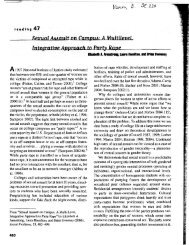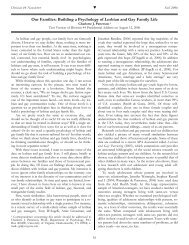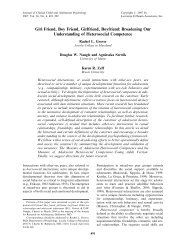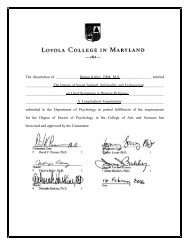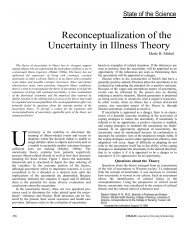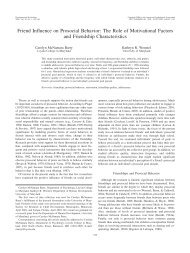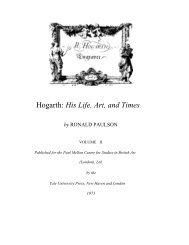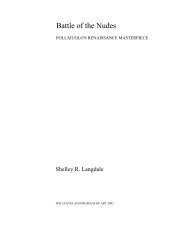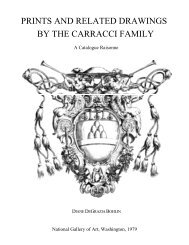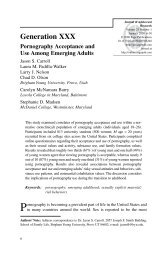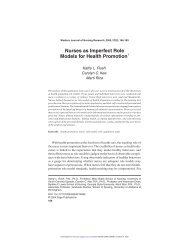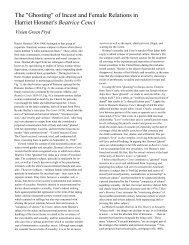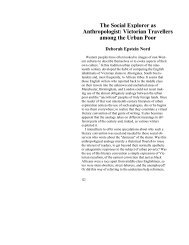17 The Close Relationships of Lesbians, Gay Men, and Bisexuals
17 The Close Relationships of Lesbians, Gay Men, and Bisexuals
17 The Close Relationships of Lesbians, Gay Men, and Bisexuals
Create successful ePaper yourself
Turn your PDF publications into a flip-book with our unique Google optimized e-Paper software.
friends outside the relationships, maintaining a sense <strong>of</strong> being individuals,<br />
<strong>and</strong> making decisions on their own. Contrary to expectation, both lesbians<br />
<strong>and</strong> gay partners reported higher autonomy than did heterosexual partners.<br />
Correlates <strong>of</strong> Relationship Satisfaction Among Same-Sex Couples<br />
455<br />
Researchers have begun to identify factors that enhance or detract from<br />
satisfaction in same-sex relationships. Like their heterosexual counterparts,<br />
gay <strong>and</strong> lesbian couples appear to benefit from similarity between partners<br />
(Kurdek <strong>and</strong> Schmitt 1987). Consistent with social exchange theory, per-<br />
ceived rewards <strong>and</strong> costs also are significant predictors <strong>of</strong> happiness in same-<br />
sex relationships (Duffy <strong>and</strong> Rusbult 1986; Kurdek 1991a, 1994c). A study<br />
<strong>of</strong> lesbian relationships found support for another exchange theory predic-<br />
tion, that satisfaction is higher when partners are equally involved in or<br />
committed to a relationship (Peplau et al. 1982). For lesbian couples, greater<br />
satisfaction also has been linked to perceptions <strong>of</strong> greater equity or fairness<br />
in the relationship (Schreurs <strong>and</strong> Buunk 1996). <strong>The</strong>re also might be links<br />
between the balance <strong>of</strong> power in a relationship <strong>and</strong> partners' satisfaction.<br />
Several studies <strong>of</strong> lesbians <strong>and</strong> gay men have found that satisfaction is higher<br />
when partners believe that they share relatively equally in power <strong>and</strong> deci-<br />
sion making (Eldridge <strong>and</strong> Gilbert 1990; Harry 1984; Kurdek 1989, 1998b;<br />
Kurdek <strong>and</strong> Schmitt 1986b; Peplau et al. 1982).<br />
Individual differences in values also are associated with satisfaction in gay<br />
<strong>and</strong> lesbian relationships. For example, individuals vary in the degree to<br />
which they value dyadic attachment (Peplau et al. 1978). A person is high<br />
in attachment to the extent that he or she emphasizes the importance <strong>of</strong><br />
shared activities, spending time together, long-term commitment, <strong>and</strong> sexual<br />
exclusivity in a relationship. <strong>Lesbians</strong> <strong>and</strong> gay men who strongly value dyadic<br />
attachment in a relationship report significantly higher satisfaction, close-<br />
ness, <strong>and</strong> love for their partners than do individuals who score lower on<br />
attachment values (Eldridge <strong>and</strong> Gilbert 1990; Peplau <strong>and</strong> Cochran 1981;<br />
Peplau et al. 1978). Individuals also can differ in the degree to which they<br />
value personal autonomy, defined as wanting to have separate friends <strong>and</strong><br />
activities apart from one's primary relationship. Some studies have found<br />
that lesbians <strong>and</strong> gay men who place strong emphasis on autonomy report<br />
significantly lower love <strong>and</strong> satisfaction than do individuals who score lower<br />
on autonomy values (Eldridge <strong>and</strong> Gilbert 1990; Kurdek 1989), but other<br />
studies have not (Peplau <strong>and</strong> Cochran 1981; Peplau et al, 1978).



